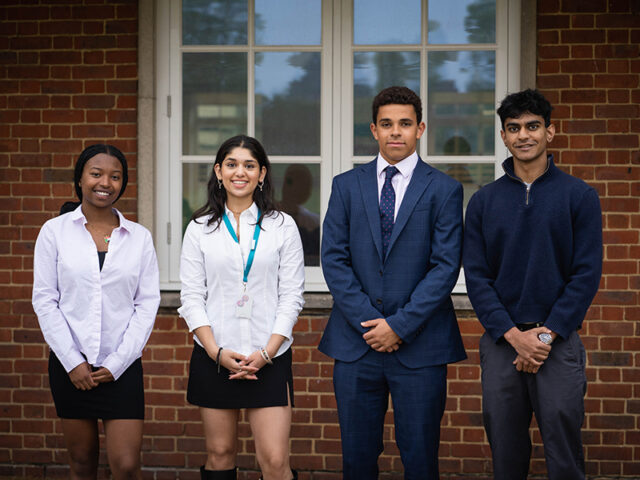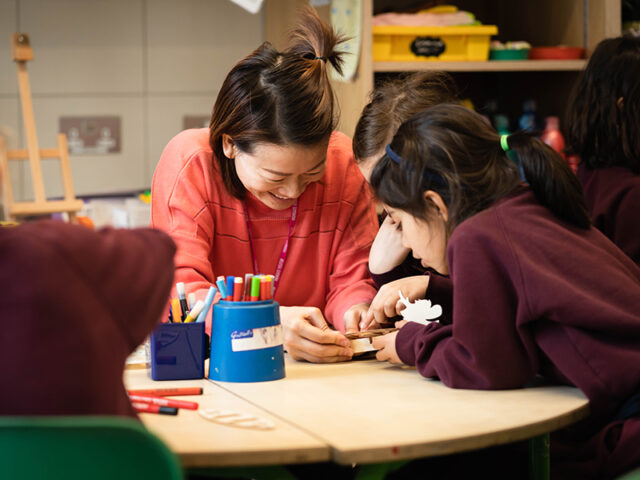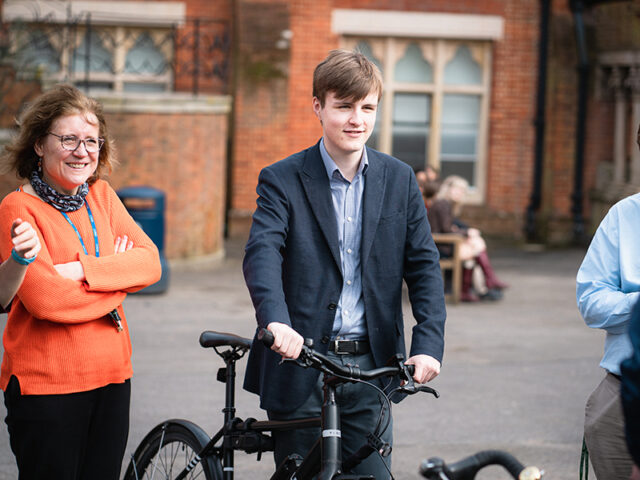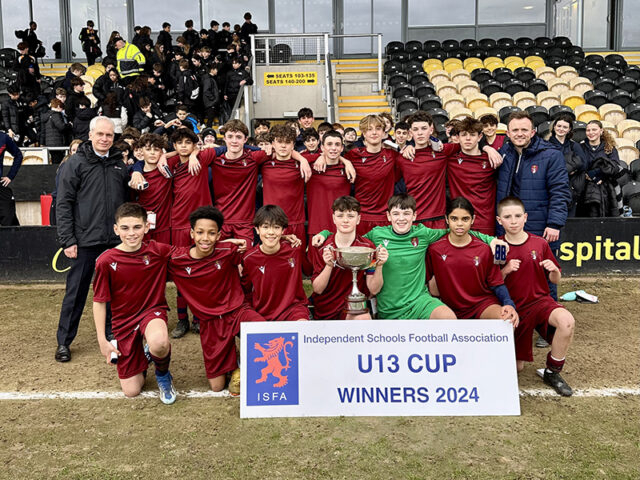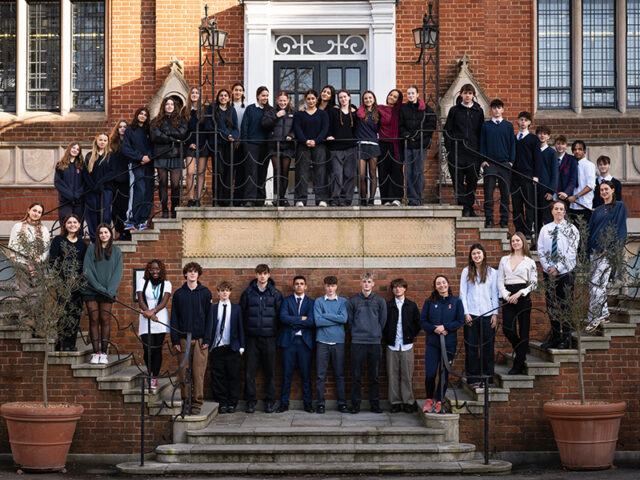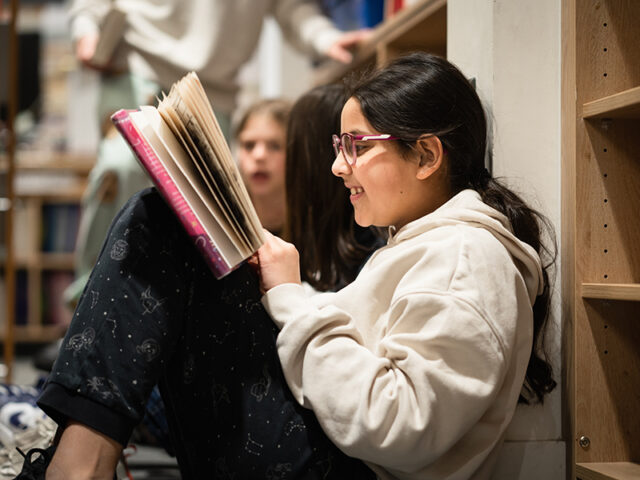The Senior School Pupil Leadership Team has launched a campaign this half term to promote the benefits of taking an active role in the community and to encourage younger pupils to follow suit.
Y13 pupils have worked together to create a legacy video campaign to share personal testimonies about their experiences of joining societies and taking on leadership positions. The video sets out to promote the personal gains from getting involved, as well as galvanising others to take action on behalf of their community. Before the end of term, members of the Pupil Leadership Team are leading their House Meetings and Tutor Times to gather feedback about the project and generate ideas for how it could be taken forward in the future.

Jenny McLoughlin, Assistant Head (Pupil Engagement), explains: “The starting point for the project was reflecting on what kind of footprint they were leaving behind them – what they felt they’d contributed to the community, and what they’d gained from it personally. I love that when asked ‘what could you do to mark your time in these roles?’, their first thought was ‘how can we make it so others get to feel this way too?”
Making an impact
Y13 students can apply for a variety of leadership roles around the School, including Prefects, House Captains, Sports Captains and the chairs of various pupil-led committees and social justice groups. Together they form the Pupil Leadership Team, meeting regularly to pool their enthusiasm and ideas, represent the interests of the wider student body and help steer change around the school (and beyond).

Contributions can involve leading assemblies, running clubs, setting up events, representing the school, running workshops for peers, and boosting confidence and participation in the younger years. Many pupils contribute to operational change around the school, from sustainable initiatives to policy review and PSHE updates.
Linnea, who co-chairs the Wellbeing, Inclusion and Safeguarding Committee (WISC), says: “You only realise once you get involved in the society or committee how much is going on behind the scenes and how many little things are being shaped by people.”
Hannah adds: “You get to see the domino effect of your actions play out on a wider scale and affect other year groups and future generations within the school.”
Edoardo agrees, “It’s important to put yourself out there to make a change, because you definitely can. Students have a very different outlook on the school. They’ll be able to analyse issues and bring forth things that they want to change or things that they want to improve.”
Personal Development
Pupils speak honestly about the challenges they faced in these leadership positions. Taking on greater responsibility, in a more visible position, is a daunting prospect for many – but with it, comes the opportunity to develop personal skills outside of the classroom environment. “I’d say you’ve just got to jump in,” explains Catherine.
Tanya, Head of School, reflects: “I’ve learned that although some things can seem really difficult or scary before you’ve done them, afterwards you feel a real sense of accomplishment as well as realising that it wasn’t as scary as you thought it would be.”

Edoardo adds: “I think it’s important to get out of your comfort zone, because it gives you a sense of fulfilment to try new things you might benefit from.”
“For me, it’s been a really good thing, confidence wise, getting involved in coaching all the younger years and really getting that leadership role that you wouldn’t get anywhere else,” Arne points out.
Freda explains how the changing dynamic, of moving away from teacher-led instructions to personal initiative and responsibility, is intimidating but rewarding.
Pupils have also found strength in the friendships and collaborations that have come with their new positions, learning to lean on and support each other in challenging situations. “Being part of a team is one of those skills you’ll use for your entire life,” Reza notes.
A Connected Community
As part of the project, pupils have been considering what makes a community feel connected and how they can empower others to get involved to make a personal contribution.
Kitty explains: “For me a connected community looks like a place that appreciates everyone and works together to accept people and make them feel comfortable.”
Mia and Kitty both talk about joining the school and how clubs helped them to develop friendships outside of lessons and connect with people of similar interests. Other pupils explain how they wanted to give something back to the communities that welcomed them when they were younger.

Kara enthuses: “Pride Soc is such a lovely welcoming environment. I wanted to be part of that and take an active role in sharing my experiences like the years above had done.”
Many pupils express their enjoyment of working across year groups, getting to meet older and younger pupils in a place of shared interest and purpose. Others applaud the opportunity to raise concerns and directly contribute to school operations.
“The thing I’ve learned is that the more you speak up, the more you realise how many people will actually be supporting you. It’s the most fulfilling feeling,” Ash explains.
“It made me feel more connected to everyone around me through learning about all of the issues that they face and all of their ideas and views on the school,” Natalie adds.
“I think one of the things that makes a community really connected is when we take the time out of our days to make sure that we talk and engage with the people and things around us and take the opportunities to get involved,” Hannah explains.
Jenny McLoughlin concludes: “I think this film is testament to a very authentic sense of connection that these pupils feel to the Highgate community: perhaps made all the stronger by the growing sense that this chapter of their lives is shortly coming to a close. They’ve invested vast amounts of time and energy into their various areas of responsibility – whether that’s been strengthening existing ventures or launching entirely new ones. I hope, ultimately, that their example has been galvanising to other pupils to see just what you can achieve when you’re prepared to stick your head above the parapet a bit and say, ‘I care. This thing matters. Let’s do something about it’.”
